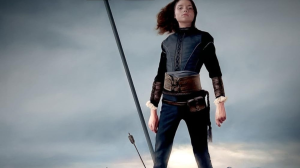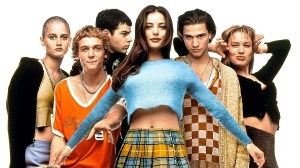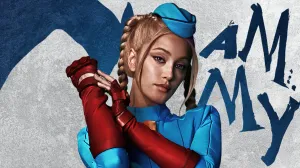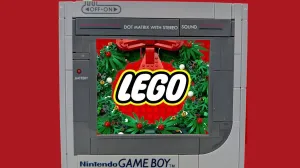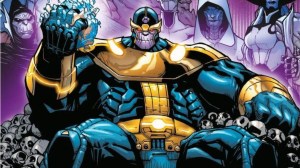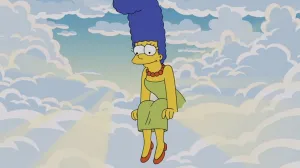Bringing the grimy, surreal world of Happy!, Grant Morrison and Darick Robertson’s graphic novel about a corrupt cop making his way through a filthy, violent Christmas tale, might have seemed borderline impossible to imagine in live-action not long ago — but changes to the TV landscape have made the Syfy almost an obvious choice for a small-screen drama.
Videos by ComicBook.com
Morrison, who serves as an executive producer on the show and who has been involved in every step of the series’ development, told ComicBook.com during a recent interview that while Syfy and the creative folks on the TV side of Happy! were accommodating and easy to work with, there were still changes that needed to be made to the series…not to rein in its insanity, but rather to expand the universe in case of future installments.
Morrison recently joined ComicBook.com to discuss the series, the next episode of which airs on Syfy tonight at 10 p.m. ET/PT.
The black comedy of the comic translated pretty well to the screen. Did you have to be conscious about the shift in the medium, or did it come over pretty well one-to-one?
We weren’t trying to do something that was a complete perfect adaptation of the comic. I don’t think these things necessarily work well the translation from one media to another, if you try and slavishly copy the original. The book was only four issues. I always wanted to do more with the characters, but there was no chance of a sequel because of how we dealt with one of our leads in the book.
If you look at it, the first episode in particular, the pilot is very close, I think, to the first episode of the comic. Because we had eight episodes to fill, we had to really expand out that world and build it out and add a whole bunch of new characters. That’s what made it interesting. It was not so much the one-to-one correspondence.
It was kind of capturing the energy, and the mood, and the feel of the comic. Because as you see, especially in the first couple, was a lot of that dark humor. There’s a lot of violence and negative energy. It’s very punk rock. But as we go in, other elements came in. It’s a Christmas story, so we got a better sentimentality. There’s moments in there that will make you cry.
So I think what we tried to do was really kind of touch in our dreams of emotional stuff, which was quite different from the comic. And that’s what makes the two of them, I think, they feel like different beasts, but at the same time, they share a lot of the same points.
All that said, the general look of the grime of this show really captures the general aesthetic of Darick Robertson’s work.
Absolutely. I think it was a really great in doing that. And obviously, Christopher Meloni is essentially identical to Nick Sax, and sells it on camera. He’s the anchor in the show, and I think he just embodied that character so well.
Along the way, Happy himself was recast. What does Patton bring to the role that nobody else could?
There’s a whole bunch of ways of doing it. We could have gone the Roger Rabbit, Looney Tunes, or we could have played with the voice in different ways. But ultimately, he’s kind of…to a certain extent, he’s a substitute for the person that Hailey’s lost in her life.
So we wanted him to be masculine. We didn’t want to do a kind of Mickey Mouse voice. And what Patton was able to do was make Happy sound sort of grown up but at the same time with all these childlike attributes.
And his way of approaching the world is filled with enthusiasm and curiosity. But he’s a spirit. He’s an angel. These kind of things we’ve seen before, but in a new form. So it was important to make sure he wasn’t just ridiculous. There’s a supernatural element to him you feel, and he does know things, and he goes understand things that maybe we don’t give him credit for, because he seems so zany.
I think Patton really caught that perfect middle ground between, this is sort of a supernatural entity that kind of knows things, but it’s also the way he has touches the world in this vivid, outrageous, kind of celebratory way. And I think he really nailed it in the voice.
Over the years, there have been a lot of Grant Morrison adaptations that never quite made it to the screen. Was this a matter of “if you want something done right…?”
Yeah, and I felt that. Because as I’ve said before, a lot of my peers, they take on maybe an executive producer role and kind of don’t do too much involvement with the actual show, the day-to-day of it. I felt it was important to be in there.
And also, I wanted to learn. After sitting in your room for years 20 years writing comics, in fact 40 years writing comics probably, I was insistent to get out and about into a much more collaborative atmosphere. And that’s what I loved about it.
Also, as you see, what is exciting to me is that it’s something that I created. I’m in Los Angeles right now, and at the end of the street there on Sunset, there’s a gigantic Happy! billboard. And it’s a main vendor that I’m looking at. Because this is something that come up in me and Darick’s head all those years ago that is suddenly on Sunset Boulevard. And everyone who’s got their car stopped at the lights there is having to look at Nick Sax breathing down at them. And that is almost psychedelic to me. It’s so amazing that thing has made that journey to see him on a gigantic billboard.
Is this something that you think is over after this season or would you like to kind of continue to live in the world of this show if it’s a bit hit and they want more?
If it’s a hit, we know exactly where we’re going with it. We do have it planned out to three seasons so far. If it’s a hit, we’ll go back to that and see if we can extend it more.
But we’ve taken it seriously. If the show is a success, we’ll know exactly what we’re doing. We know where it’s going. There’s a real big mythology behind it, which people won’t really be aware of until somewhere around I think episode four you start to see hints of it.
So yeah, very much so. We’d love to keep going with these characters because we love them so much.
You are a big idea writer. Do you think that working on something like JLA or even The Invisibles where you were at the same project for years at a time preps you for working in TV and not getting too restless, wandering off to the next kind of big exciting thing?
Yeah, definitely. I think a lot of what’s going on in TV now owes so much to comic storytelling. Comics were the place where you came to for a serial fiction that could actually run indefinitely if need be. And we were all chained to it.
The Invisibles went for six years. I did Batman for seven years. And in all of those cases where I’ve done long runs … or in X-Men, I kind of work it out like a TV show. There are seasons that are arcs. There are beginnings and ends to particular storylines. And now, I’m watching TV and seeing all those exact same techniques applied to television.
So, yeah, it’s something I’m very familiar with, and all of us who worked in comics over the last 20 years particularly, I think have been trained in writing and doing that kind of work, serialized fiction with a long-running subplots going through it and that sort of thing.
Again, like Darick’s artwork, there are some genuinely gruesome elements to this show that seem to work because they’re black humor…
We wanted to get away with kind of ridiculous images, like Nick Sax with the fire extinguisher. He’s spraying it at the guy’s head. And we get away with things like that because of the humorous thing.
If that was sort of a grim show, it would just seem like the lead character was a complete psychopath. But because there were those elements of humor that we bring, we get away with it. And Sax is still coming away lovable even after we’ve seen him cave someone’s head in with a fire extinguisher.
A lot of it is owing to Meloni. He is the anchor in the show, and as I’ve said before, he’s amazing at improvising. He just becomes the character. So all you have to do is ask him to speak and he’ll come out with lines that Sax would have said because he inhabits the role so much.
So I definitely think his approach to it and his love of slapstick. The Three Stooges and things like that, which he always brings in as influences, really allowed us to hit that tone which was I think the right tone, as you see. That middle lane of being gross and offensive and also being kind of lovable and funny.


